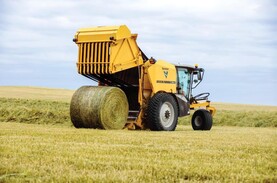As a farmer, I obviously welcome the fact that the UK and EU came to a Christmas Eve 11th hour agreement to allow tariff-free trade. Nonetheless, we shouldn’t be particularly surprised or elated that they came to a deal.
Despite what a lot of commentators and politicians would have had you believe, they were always going to come to some sort of a messy divorce settlement.
But while EU exports to the UK are tariff-free, they are not customs-free. A paper trail of expensive documentation and checks will be a right pain in the derriere for logistics, creating more bureaucracy, which the EU does well and the UK wanted to be rid of.
They simply had to talk themselves into a deal and nobody – not even Boris Johnson – was ever going to throw the toys out of the pram
The UK is a huge market for EU-manufactured cars and vice versa. The same can be said for agricultural produce. They simply had to talk themselves into a deal and nobody – not even Boris Johnson – was ever going to throw the toys out of the pram.
Master of brinkmanship
Boris, for all his huffing and puffing, played a clever game and frightened the bejaysus out of the EU. Those battleships he dispatched patrolling the fishing waters sent the French delegation rushing to the toilet. He’s the master of brinkmanship. Yes, he’s a bombastic clown, but don’t underestimate him.
As a result, he got what appears to me to be a good deal for the UK. Even ardent Brexiteers are happy, bar the DUP. But they’re never happy.
He’s managed to hold on to most of his fisheries and yet have full and free access to the giant European single market of 450m people.
What if the EU bans glyphosate in a few years’ time and the UK doesn’t?
It’s the third largest market in the world after China and India. Am I missing something? It’s a cracker of a deal for him and unprecedented anywhere in the world.
But our poor fishermen have been sacrificed in the process. They shouldn’t have been and this is fundamentally wrong. The EU should have held firm and achieved 100% access to UK waters. That surely is the quid pro quo for free access to the European market.
However, there will be always be Brexit issues to be sorted down the road. From a selfish point of view, what if the EU bans glyphosate in a few years’ time and the UK doesn’t? Will British glyphosate-sprayed grain be allowed in here? I hope it won’t, but if it’s like GM produce, it will be. Millions of tonnes of GM soya arrive into Europe every year, while no mainstream GM crops can be grown in the EU.
Jumping ship
There is, of course, now the elephant in the room. With such favourable treatment of the UK, will other countries be tempted to jump ship? Do you think the French would get the same deal? They would on their derriere. The UK deal is unlikely to be replicated. We would have nothing to gain, as a small open economy, from leaving the EU. The EU has been good to us, but that will increasingly change as we become a net contributor.
We won’t be able to compete with the UK’s newly found markets for cheaper South American or Australian bee
And we have been perfect Europeans, ratifying every agreement that was stuck in front of us. But, and I don’t know about you, the more European we become, the more Irish I want to be.
However, even if we were outside the EU, we wouldn’t get preferential trading terms from our nearest neighbour. We won’t be able to compete with the UK’s newly found markets for cheaper South American or Australian beef, as indeed we can’t now as an EU member.
The glory days are gone forever. After all, Brexit was a messy divorce, and I can’t help but think that the UK got custody of the children. But some of the children may yet rebel …






 This is a subscriber-only article
This is a subscriber-only article











SHARING OPTIONS: